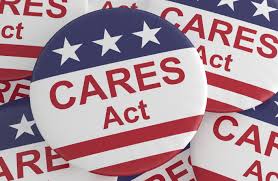Amidst the volatility and uncertainty caused by the COVID-19 pandemic, our firm remains steadfast in our commitment to safeguard you and your families, strengthen your businesses, and preserve and enhance your estates.
The passage of the $2.2 trillion stimulus bill, The CARES Act, affects individuals, small business owners, holders of retirement plans, taxpayers who make charitable contributions, and others. The following is a brief overview of how portions of the CARES Act may affect you. For additional information, please contact us.
Who is eligible for CARES relief funds.
The IRS will determine eligibility from your 2019 tax return (or from your 2018 return if the 2019 return has not yet been filed).
- If you are single: You will receive a payment of $1,200 as long as your adjusted gross income (AGI) does not exceed $75,000.
- If you are married filing jointly: You will receive a payment of $2,400 as long as your AGI does not exceed $150,000.
- If you claim a child under the age of 17 as a dependent on your tax return, you will receive a payment of $500 per child.
- Once over the above AGI thresh holds, you lose $5 of your relief payment for every additional $100 of AGI. This AGI reduction also applies to the $500 per child payment.
- Head of household filers have a separate set of AGI limits.
- Individuals on Social Security are eligible to receive the relief payment as long as their total income does not exceed the AGI limit.
Payments will be made now through December 31, 2020; in many cases paid electronically if you have previously provided direct deposit information to the IRS on your 2018 or 2019 tax return.
Note: Any payment you receive acts as an advance payment of a credit you will include on your 2020 tax return.
Who is not eligible for relief funds.
Not everyone is eligible for relief. CARES excludes anyone who isn’t a child (age 17 and over) and who can be claimed as someone else’s dependent. This group includes high-school students, college students up to age 23 and some disabled and elderly people, many of whom show up on the tax returns of the people they live with who provide most of their support. This means that these persons won’t get money directly, and no one will get money for them (in all, about 21 million Americans, according to the Tax Policy Center).
Small Business Loans
The CARES Act also supports small businesses with fewer than 500 employees, as of March 1 through December 31, 2020. Specifically, these small businesses will have access to loans up to $10 million under the SBA’s 7(a) loan program. The amount of the loan is based on expenses of the business in the previous 12 months immediately before the loan. Expenses eligible for inclusion are payroll, mortgage payments, rent payments, and payments on any other debt obligations.
Special Rules for Use of Retirement Funds
The CARES Act waives the 10 percent penalty on early distributions from qualified retirement plans for up to $100,000 of COVID-19-related distributions in 2020. Taxpayers may repay these amounts within three years of withdrawal without regard to that year’s cap. Although these distributions are otherwise taxable for federal income tax purposes, the taxpayer may elect to include the distribution in taxable income ratably over a three-year period.
This relief is available to an individual:
Who is diagnosed with SARS-CoV-2 or COVID-19;
Whose spouse or dependent is diagnosed with such virus; or
Who experiences adverse financial consequences as a result of being quarantined, furloughed, laid off, having work hours reduced, being unable to work due to lack of child care due to COVID-19, closing or reducing hours of a business owned or operated by the individual due to COVID-19 or other factors as determined by the Treasury Secretary.
Charitable Contributions
Taxpayers who do not otherwise elect to itemize deductions are allowed an above-the-line deduction in 2020 for up to $300 for charitable contributions made in cash (not stock) to any qualifying Section 501(c)(3) public charity, excluding donor-advised funds.
We are closely monitoring emerging details about The CARES Act and will update you as additional information becomes available. In the meantime, please contact us with any financial planning questions or concerns. We are here for you.





